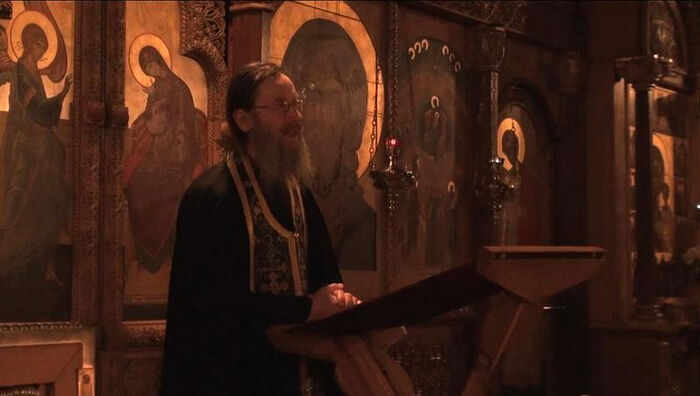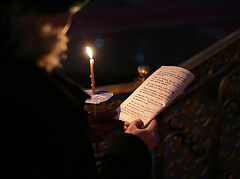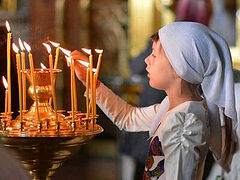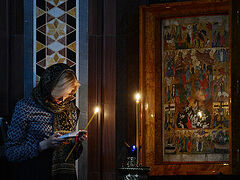Today the Holy Church and all of us have taken the first step, a very important one, in the mysterious, long and penitential path of Lent. Its first day has passed, and after reading the Canon of St. Andrew of Crete the soul of each one of us has plunged into a deep, prayerful, Lenten atmosphere.
Thank God that the time of Holy Lent has come. This is a period of struggle with the spirit of “idleness, despondency, ambition and vain thoughts”—we will hear the words of the Prayer of St. Ephraim the Syrian for a long time, and it will penetrate deeply into our hearts.
Lent is an amazing opportunity for each one of us, for each member of the Church, to escape from the deadening vanity, running around, chattering, and the endless pursuit of some dubious “values”. This is a time of struggle with countless passions, sins, and vices that enslave us, nesting in our hearts. When a person is in bondage to voluntary vanity, to the spirit of the age, it often seems to him (because he lives without prayer, without grace) that God is somewhere far away and that the whole world is woven from cold chunks of the ice of indifference and boredom. But each one of us knows that once we force ourselves to stop at least for a minute, tear ourselves away from vanity, meditate, pray and lift our hearts up to God, we will immediately understand that God, His love and Eternity are all very close!
Lent is an opportunity for each one of us to stop our endless haste and think about Eternity. According to the Holy Fathers, Lent is an amazing space of love, kindness, mercy and indulgence towards others; it is a space of repentant prayer, contrition, and the memory of death. All these concepts are close to us—we hear them every day, read about them in the Holy Gospel; and the Church tells us about them every day.
But still, how can we make all that we read and hear become truly the inheritance of our souls—not some pious imitation of a spiritual life, but real life? Of course, it is a very difficult task. But Lent has been given to us to help us—a unique opportunity to not neglect ourselves and to take a small step towards our souls. How can we make this amazing meeting of a person with his soul take place?
If we look at our lives, which are often woven from moments of vanity and haste, each one of us can ask himself: “What is more important to me—not to miss a moment for some new pleasure, for some new earthly discovery, or not to miss a moment in acquiring eternal life?”
The Holy Church will always, and especially in these penitential days—deep, mysterious and at the same time joyful—remind us every day at services about the most important thing—seeking the Kingdom of God in our hearts, the need to acquire the Holy Spirit, the Spirit of love, peace and joy. This task is extremely hard because it is easier for us to focus on something external, even while fasting—on the menu, on abstaining from some kinds of food, from watching TV, from some pleasures, from going to entertainment events, etc. This is certainly important, but we must understand that the depth of our labor lies not only in this.
St. Barsanuphius of Optina (commemorated April 1/14) reflects wonderfully on monasticism. He spoke about prayer, the essence and depth of the monastic life, but these words apply not only to monastics, but also to any layperson, to any Orthodox believer. St. Barsanuphius says that external monasticism can be likened to plowing the land; but no matter how much you plow, “nothing will grow unless you sow something. Inner monasticism is sowing, and its seed is the Jesus Prayer. Prayer illuminates a monastic's entire inner life and gives him strength to struggle.”
These words of Elder Barsanuphius of Optina remind us that there is an inner component of fasting, the most important being: the sowing of prayer, which the elder speaks about. It will help the land of our heart to produce the grace-filled fruits of humility, meekness, inner weeping, and prayer of the heart. St. Silouan of Mt. Athos says that if you want to pray purely, then be humble, be abstinent, confess more often and more purely, and then prayer will come to love you.
Our Church is an experience of eternal life that does not begin on some abstract level, but already today, right now, here and in this particular human heart.
To a person who is lost in this life, who has been deceived by false attitudes and ideas, to which there is no end in the world, the Church returns a sense of uniqueness, authenticity and depth of his life—a feeling that only faith, only Christ and the Church can give.
The Holy Church gives a person all this fullness, colors, air and light—the experience of deep feelings. And it is in the space where Divine Providence has placed each one of us—where a person lives, works, serves, and labors—that his soul grows into eternal life. No matter what paths humanity invents—be it new technologies, approaches to development, or new national ideas—there is only one true path. This is the path of the Gospel, about which Christ Himself says: Thou shalt love the Lord thy God with all thy heart… Thou shalt love thy neighbour as thyself (Mt. 22:37,39). There is nothing more important, profound and sublime in the world than this commandment.
St. Justin (Popovic) of Celije says that Christians must carry the radiant image of Christ through the twilight of life in the modern world, proclaiming it to the world, which is lost in the wilds of self-love. And the Gospel speaks of love for God and for your neighbor. Perhaps it is the duty of every Christian to carry the radiant image of Christ, about which the venerable father speaks. And, of course, a believer need not proclaim Christ by standing with a megaphone in a large square or pestering his relatives—as we often do, demanding that they repent immediately of all their sins, start going to Church, etc. Such “preaching” does not usually bear fruit, because the best preaching is when a believer shines from within with love, leniency towards others, mercy, inner peace, prayer, grace and harmony. Of course, it is very difficult, because we do not always succeed in shining from within. But this is what the Church calls on us to do.
After all, why does the world suffer? We see this suffering around us every day. Why does a non-believer perceive this world as a catastrophe, as a leap into the abyss, as a labyrinth of utter boredom, despondency and indifference? Why does such a person regard himself as the end point of a lifelong journey? He puts neither God nor truth, but himself at the center of the universe and believes that he is the ultimate goal of his movement. Why do people take drugs? Why do they fill their lives with fantasies, clothes, laughter, cynical pleasures and falsehood? There are thousands of other things behind all these that a lost person himself does not understand. But the most important thing is that behind this lies emptiness, the absence of God, because any passion is the fruit of emptiness, the fruit of the lack of desire to move towards faith, towards God.
May our Lenten labors be repentance and contrition. May the people whom we will meet—at work, on the train, in the subway or on the street—during Lent (this season will surely fly by quickly), people who are lost, who know nothing about the Church and faith—feel if only a little warmth and care from us may then see that there is another life, that “these people”, as they used to say about Christians in ancient times, are “special people: they live in a different way.” True, today we don't live the way the first Christians lived. But still, let the people we meet feel that there are other values and other goals in this life.
How wonderfully St. Maximus the Confessor says that the attitude of Christians towards the world around them should be neither sensual, nor insensitive, but sympathetic. This sympathy for the world should distinguish a Christian. Our little good Lenten labors (and we must set this task before ourselves)—maybe a little prayer for someone, a glass of water, some small good deed—let them be our mission, our preaching, our Lenten work. But for this to happen there should not be emptiness, lack of grace and prayer in our hearts, but there should be grace-filled gifts in the heart, which the Holy Scriptures tell us about: The fruit of the Spirit is love, joy, peace, longsuffering, gentleness, goodness, faith, meekness, temperance (Gal. 5:22, 23). There are very few of these fragrant fruits in our hearts. Everyone knows this from experience. And today we have heard in the Canon of St. Andrew of Crete, “I have marred the beauty of my mind.” These are marvelous words!
St. Nektary of Optina (commemorated April 29/May 12 and October 11/24) said, “Well, okay, it’s bad with me; but it’s good with grace.” What does this mean? Things are going very bad for me, but the Lord will help me; He will touch my heart with His grace, and help and support will surely come. The most important thing is that we should seek it and long for God. And may Lent help each one of us in some way to discover something new in our spiritual life. Of course, the most important thing is that we should have repentance, learn patience, indulgence towards others, prayer, wisdom, perhaps just good treatment of our neighbors—worldly wisdom that we so often lack—because our relations with others are often completely clouded by emptiness.
If a person is ill but does not grumble, if he understands that this illness, perhaps even a serious one, was given to him to cleanse his heart of numerous passions, then the experience of pain is transformed and becomes that of recovery. If a person has lost his loved ones, but sees this not as an accident but as Divine Providence, then the experience of loss becomes that of gain. And if temptations, difficulties, sorrows, and unexpected crises befall us (after all, anything can happen on the path of life), and we do not blame anyone, neither God nor our neighbors, but rather accept all that happens to us with a pure heart, then the experience of everything that happens in our lives becomes an amazing, joyful and extremely necessary work of gratitude to God and Heaven.
Lent should not be only external. It is not about frowning, but about inner concentration; it is not about abstaining from delicious dainties, but about the abandonment of hatred, judging, enmity, anger, boredom, indifference and other passions nesting in our hearts. Lent is the mirror in which each one of us must, through abstinence and repentance, see our hidden passions. The Prophet Isaiah says, And an highway shall be there, and a way, and it shall be called The way of holiness; the unclean shall not pass over it; but it shall be for those: the wayfaring men, though fools, shall not err therein (Is. 35:8). Lent is a very difficult path, on which we have today taken only the first step. But the goal of this path is wonderful, beautiful, deep, and very inspiring. This goal is the Holy Pascha of Christ. Amen.




